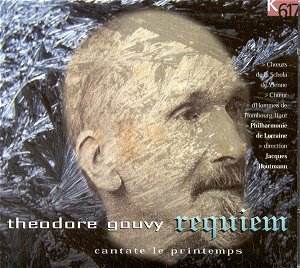|
|
Search MusicWeb Here |
|
 |
||
|
Founder:
Len Mullenger (1942-2025) Editor
in Chief:John Quinn
|
|
|
Search MusicWeb Here |
|
 |
||
|
Founder:
Len Mullenger (1942-2025) Editor
in Chief:John Quinn
|
 |
Theodore GOUVY (1819-1898) Requiem Op.70 Cantate le printemps Op.73 Elsa Maurus (mezzo-soprano) Gerard Garino (tenor) Manfred Hemm (bass) Schola Cantorum Wien Choeur de l’Hommes de Hombourg-Haut La Philharmonie de Lorraine/Jacques Houtmann Recorded Salle de Metz, 6-9 June 1994 |
| CD available for post-free online mail-order or you may download individual tracks. For some labels you can download the entire CD with a single click and make HUGE savings. The price you see is the price you pay! The full booklet notes are available on-line. | |
|
NOTE • Click on the button and you can buy the disc or read the booklet details • You can also access each track which you may then sample or down load. • Further Information. |
|
|
Théodore Gouvy, like so many late 19th century composers, is totally overshadowed by his greater contemporaries, and again like so many others at the time, he had to make a basic decision regarding in which camp he pitched his tent, that of the modernists, the New-Germans (Wagner and Liszt), or the more traditionalist line stretching from Mendelssohn, through Schumann, to Brahms. Gouvy made the same decision as Bruch, choosing the latter group. His music is charming, tuneful, harmonically safe, the orchestration masterful as well as colourful. He was a Frenchman influenced by the German School, much like César Franck or, to a certain extent, Saint-Saëns. He wrote about 160 works of all genres except concertos, and not much remains extant in print, or indeed ever got into the public domain. Chamber music was important, there are a couple of operas never performed, while the latter part of his life was dominated by the creation of large oratorios.
The Requiem was written in 1874, bad timing perhaps as this was the year Verdi chose to write his. It is written for traditional forces, four soloists and chorus accompanied by standard size orchestra (but no percussion or harp), and is in a seven-movement structure with some notable omissions such as the ‘In Paradisum’ or ‘Libera me’. The work’s strength lies in the vocal writing such as the Tuba mirum for chorus alone (tr2 2.40), a tender Parce Deus for soloists and chorus (tr4 7.00), while there is a curious tribute to Mozart (the opening of the Finale of his ‘Jupiter’ Symphony) as the Sanctus is intoned by the solo soprano (tr6 0.14) after a brass fanfare, followed by full chorus.
The Spring Cantata for male-voice choir and soprano was a tactical error on Gouvy’s part, for if he had used a contralto it would have made a nice pairing with Brahms’s Alto Rhapsody and perhaps secured a place in the choral repertory. It was written in 1878, four years after the Requiem, probably to a text by Gouvy himself, and is an allegorical description of the Spring Sun victorious over March storms in four movements. Its best music is a charming combination of all vocal forces in its finale (tr9 12.00).
The performances of both works vary somewhat, much of the problem being an over-resonant recording ambience; it sounds like a cathedral but is evidently not but rather a hall (Salle de Metz). The chorus is too distant but the soloists are good, particularly Greenwald, and the orchestra versatile if not always adequately focused in their chording. Both works receive their first recordings here, so for that we must be grateful.
Christopher Fifield
|
|
ADDITIONAL INFORMATION •
You can sample only 30 seconds (or 15% if that is longer) of a given track. Select from the View tracks list. Each sample will normally start from the beginning but you can drag the slider to any position before pressing play. • PLEASE NOTE: If you are behind a firewall and the sound is prematurely terminated you may need to register Ludwig as a trusted source with your firewall software.
•You will need Quicktime to hear sound samples. Get a free Quicktime download here • If you cannot see the "Sample All Tracks" button you need to download Flash from here.
|
|
|
Return to Index |